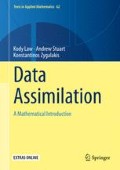Abstract
The formulation of the data-assimilation problem described in the previous chapter is probabilistic, and its computational resolution requires the probing of a posterior probability distribution on signal-given data.
Access this chapter
Tax calculation will be finalised at checkout
Purchases are for personal use only
Notes
- 1.
Indeed, we prove such a result in Lemma 4.7 in the context of the particle filter .
- 2.
Recall that we use the ∧ operator to denote the minimum between two real numbers.
References
A. Beskos, G. O. Roberts, A. M. Stuart, and J. Voss. MCMC methods for diffusion bridges. Stochastic Dynamics, 8(3):319–350, Sep 2008.
S. Brooks and A. Gelman. General methods for monitoring convergence of iterative simulations. Journal of Computational and Graphical Statistics, 7(4):434–455, 1998.
A. Bryson and M. Frazier. Smoothing for linear and nonlinear dynamic systems. In Proceedings Optimum System Synthesis Conference. US Air Force Tech. Rep. AFB-TDR-63-119, 1963.
S. L. Cotter, M. Dashti, and A. M. Stuart. Variational data assimilation using targeted random walks. Int. J. Num. Meth. Fluids, 2011.
S. L. Cotter, G. Roberts, A. M. Stuart, and D. White. MCMC methods for functions: modifying old algorithms to make them faster. Statistical Science, 28:424–446, 2013.
M. Dashti, K. J. H. Law, A. M. Stuart, and J. Voss. MAP estimators and posterior consistency in Bayesian nonparametric inverse problems. Inverse Problems, 29:095017, 2013.
A. Gelman, J. B. Carlin, H. S. Stern, D. B. Dunson, A. Vehtari, and D. B. Rubin. Bayesian Data Analysis. CRC Press, 2013.
A. Gelman and D. B. Rubin. Inference from iterative simulation using multiple sequences. Statistical science, pages 457–472, 1992.
W. K. Hastings. Monte Carlo sampling methods using Markov chains and their applications. Biometrika, 57(1):97–109, 1970.
V. H. Hoang, K. J. Law, and A. M. Stuart. Determining white noise forcing from Eulerian observations in the Navier–Stokes equation. Stochastic Partial Differential Equations: Analysis and Computations, 2(2):233–261, 2014.
J. Kaipio and E. Somersalo. Statistical and Computational Inverse Problems, volume 160 of Applied Mathematical Sciences. Springer-Verlag, New York, 2005.
J. S. Liu. Monte Carlo Strategies in Scientific Computing. Springer Series in Statistics. Springer, 2001.
N. Metropolis, R. Rosenbluth, M. Teller, and E. Teller. Equations of state calculations by fast computing machines. J. Chem. Phys., 21:1087–1092, 1953.
S. P. Meyn and R. L. Tweedie. Markov Chains and Stochastic Stability. Communications and Control Engineering Series. Springer-Verlag London Ltd., London, 1993.
J. Nocedal and S. Wright. Numerical Optimization. Springer Verlag, 1999.
C. Robert and G. Casella. Monte Carlo Statistical Methods. Springer Texts in Statistics. Springer-Verlag, 1999.
D. Zupanski. A general weak constraint applicable to operational 4DVAR data assimilation systems. Mon. Wea. Rev., 125:2274–2292, 1997.
Author information
Authors and Affiliations
3.1 Electronic Supplementary material
Below is the link to the electronic supplementary material.
Rights and permissions
Copyright information
© 2015 Springer International Publishing Switzerland
About this chapter
Cite this chapter
Law, K., Stuart, A., Zygalakis, K. (2015). Discrete Time: Smoothing Algorithms. In: Data Assimilation. Texts in Applied Mathematics, vol 62. Springer, Cham. https://doi.org/10.1007/978-3-319-20325-6_3
Download citation
DOI: https://doi.org/10.1007/978-3-319-20325-6_3
Publisher Name: Springer, Cham
Print ISBN: 978-3-319-20324-9
Online ISBN: 978-3-319-20325-6
eBook Packages: Mathematics and StatisticsMathematics and Statistics (R0)

